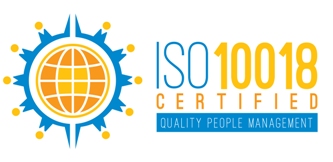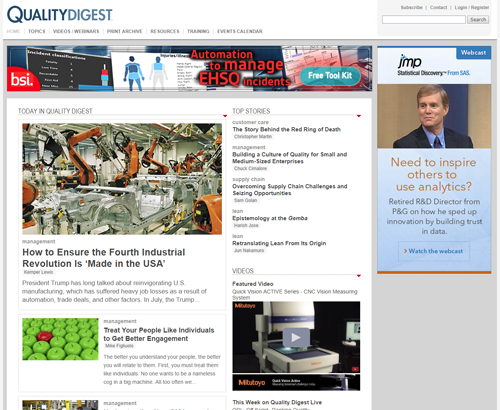News Analysis: ISO 10018 Offers New Channel for Engagement Services
- Quality Management Receptive to New Ideas
- Issue of People Critical to Quality
- A Higher Level of Decision-Maker
- Influencers on Key Decisions
 The new ISO 10018 quality management standard and certification promises to create a new avenue for the sale of formal engagement strategies: Quality Management departments. Because more than 35,000 U.S. companies alone follow IS0 9001 standards - which already include requirements related to employee training and development - there exists a large community of Quality Management professionals potentially interested in ISO 10018, representing a new avenue for organizations that provide formal engagement services and products.
The new ISO 10018 quality management standard and certification promises to create a new avenue for the sale of formal engagement strategies: Quality Management departments. Because more than 35,000 U.S. companies alone follow IS0 9001 standards - which already include requirements related to employee training and development - there exists a large community of Quality Management professionals potentially interested in ISO 10018, representing a new avenue for organizations that provide formal engagement services and products.
To learn more about the Quality Management marketplace and the potential of ISO 10018, ESM recently interviewed experts in Quality Management. In addition, it asked its sister company, The Engagement Agency, to conduct a sales experiment to determine the ease or difficulty of finding Quality Management professionals receptive to learning about ISO 10018 standards. The preliminary conclusion is that Quality Management decision-makers may be easier to access than management in other fields, and that Quality Management has an interest in ISO Quality People Management standards and certification.
 According to Mike Richman, Publisher of QualityDigest.com, the leading news and information portal in the quality field, “There is a lot of potential for the ISO 10018 standards and certification because the quality field already embraces the importance of people. In the past, there has been this idea that human resources, or human capital management, can’t be a process. Why not? There should be an organized and formal approach to leadership, recruiting and onboarding, assessment, rewards and recognition, etc. I think that standards that help organizations apply a process to people management in the same way they do to quality process management have a lot of potential.” Richman says that QualityDigest.com has about 100,000 unique visitors a month and a newsletter community of about 30,000 professionals involved in all areas of Quality Management, including corporate quality management, consultants, solution providers, and certification bodies, many of whom he believes will have an interest in a new standard focused on Quality Management.
According to Mike Richman, Publisher of QualityDigest.com, the leading news and information portal in the quality field, “There is a lot of potential for the ISO 10018 standards and certification because the quality field already embraces the importance of people. In the past, there has been this idea that human resources, or human capital management, can’t be a process. Why not? There should be an organized and formal approach to leadership, recruiting and onboarding, assessment, rewards and recognition, etc. I think that standards that help organizations apply a process to people management in the same way they do to quality process management have a lot of potential.” Richman says that QualityDigest.com has about 100,000 unique visitors a month and a newsletter community of about 30,000 professionals involved in all areas of Quality Management, including corporate quality management, consultants, solution providers, and certification bodies, many of whom he believes will have an interest in a new standard focused on Quality Management. Quality Management Receptive to New Ideas
Richman says that Quality Management professionals are relatively easy to find in ISO 9001 certified companies and that it’s their job to be receptive to new ideas to improve performance. “Organizations spend a lot of time and effort to receive and maintain ISO 9001 certification, and they are proud of it. Although the standard is primarily designed to improve the output of the organization, it’s also an important sales and marketing tool, and so management takes it seriously.” In fact, he says, the latest ISO 9001 standards require top management leadership participation. “The ISO 9001 audit now requires that top management be directly involved in the Quality Management effort, so the people in charge of quality generally have C-suite access or involvement with a lot of influence over investments required to comply with the standards.”
To test that premise, ESM engaged its sister marketing company, The Engagement Agency, to identify and cold call Quality Management at leading companies to see how difficult it is to find and access these decision-makers. According to Nick Gazivoda, Vice President of Sales, “Our test found that it is relatively easy to find and access the decision-makers. It’s too soon to tell how many will be interested in ISO 10018 certification, but in our test it was not hard to find the quality decision-makers and to reach them by phone. Those that we spoke with were interested in learning more about ISO 10018.” Gazivoda explains that in every case, the company operators were able to immediately identify the person in charge of quality, and that in multiple cases it was possible to reach that person to explain the new ISO 10018 standards. “Given that it is so difficult to identify decision-makers through an operator or reach anyone on the phone in many fields, we were surprised by the ability to access these people.”

Richman of QualityDigest.com is not surprised by the results. “Companies that are ISO 9001 are serious about it," he says. "In most cases, employees are very aware of ISO 9000 standards because employee involvement is critical. Also, many companies will not do business with another company that doesn't have ISO 9001 compliance, so you can be pretty sure that the receptionist or others who answer the central number have it drilled into them that the company is IS0 9000 certified, because the company never knows whether a caller is checking to see if the company is certified.”
Issue of People Critical to Quality
The issue of people is critical to ISO 9001, Richman says, which explains why he feels many companies will be receptive to ISO 10018 Quality People Management standards. “In quality, we always talk about this hierarchy of principles, culture and tools. Often, quality people will think only about the tools of quality: ‘we have to execute so we have to get this or that done,’ but without the right culture and principals you’ll never get the tools right. The quality people must be ready to parachute into every part of the company to ensure that customer needs get addressed.
It’s also not surprising to Richman that the ESM test found Quality Management potentially easier to access. “The quality culture is all about receptivity to new ideas. They are the ones who need to have their ears to the ground. Their assignment is to improve the company in whatever what it takes. That can be any new idea that can help make money, foster more efficiency, please customers, or even create new sales. I've seen many different titles in the world of ISO 9001 standards. In smaller companies it might be just one person, but in larger companies it can include multiple people. In either case these are people with direct access to the C-suite. Our industry is a crazy mix of many different types of people, but they have a lot of influence over the investments organizations make to foster continuous improvement and innovation.” The term “quality,” Richman says, is used less today. He notes that many of these functions reside in the performance, continuous improvement, or innovation group within a company. "Obviously, anyone who is calling upon Quality Management better be well versed in quality management principles, as well as the ISO 10018 standards. It won't hurt for solution providers to themselves have ISO 10018 certification if it's their goal to sell services that support it."
A Higher Level of Decision-Maker
The typical person in charge of quality is generally “of a higher level,” Richman says. “Most of these people are relatively far along in their careers. If it’s a manufacturing company, many times it’s someone who has risen from the shop floor and who now is in their late 40s or early 50s. Or it's someone who has come out of customer service or the call center, depending on the type of company. These are people willing to roll up their sleeves to find new ways to help improve performance, and they're usually the people who know the company and culture as well as anyone because they've been through the audits and know where the skeletons are buried. They are usually intimately connected with the ways organizations work, because they work with nearly every department, including sales, customer service, operations, or whatever it takes to improve performance. It’s their job to slay dragons across the organization.”
Richman explains that the function of quality brings together research and development, human resources, marketing, sales, customer service and top management. “Quality interfaces with everyone. Division heads might have different views, but the quality person is often the ultimate arbiter. Someone in research and development and sales might be requesting big investments, but the Quality Manager is often the voice of the customer and might say: ‘That all may be true, but when you put it all together our real problem is that our pricing is too high.’” The quality manager must be the honest broker, he explains. “This person is an advocate for the customer. Many times, this person has a cross-functional role that has influence on almost every part of the company.” Quality departments, he says, have clout in ISO 9001-certified companies because it’s a critical part of the organization’s strategy.
This view is supported by Jun Fabella, President of Dynalabs, a pharmaceutical testing company in St. Louis that is already ISO compliant and is seriously considering ISO 10018. “My view is that it's just as necessary to bring a process approach to our human resources as it is to our quality management resources, which is why our human resources management will head up this initiative. For me, the benefits include making sure everyone in the organization understands our culture, values and objectives, and that we systematically create an environment that makes it easier to recruit and retain talent and continually anticipate and meet customer and regulatory requirements related to human capital management. I see ISO 10018 as a way to address the growing number of questions we receive about our talent management process from customers and regulators. I also see ISO 10018 as an advantage with potential investors in the future.”
Influencers on Key Decisions
While Quality Management’s direct budget might be related to ISO certification audit, registration costs, or tools needed for testing and measurement, “Quality Management professionals are strong influencers in other parts of the organization," explains Richman. "Compliance might require investments in new services or equipment that are the responsibility of one part of the company or another, and Quality Management might not make the final decision as to a vendor selected, but they’ll have a lot of influence on the requirements or specifications related to the work.”
Who can profit from this new certification? Richman believes that ISO 9001 auditors and certifiers can be key players, as well as consultants and other solution providers that can assist organizations with compliance. “Anyone interested in ISO 9001 is interested in other standards being produced by this technical committee to improve performance," he says. "I would imagine that in the world of Quality People Management there are many tools and services that can help organizations, just as there is in process management. ISO 10018 has the potential to create an entirely new marketplace of auditors, consultants and developers. It will require the IS0 9001 world to learn about a new field of Quality People Management and for the engagement marketplace to understand the language of quality management and continuous improvement."














